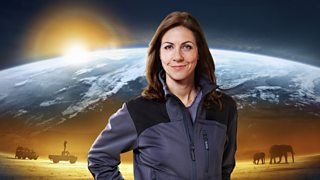Planet Earth Live: Making ambitious wildlife programmes
Tim Scoones
Excecutive Producer Springwatch
We are delighted to say that over five million viewers tuned in to watch the wildlife action on Planet Earth Live on Sunday and we are hoping they will join us for tonight's updates with Richard Hammond in Kenya and Julia Bradbury in Minnesota. While millions tuned in, thousands are following the regular updates from the field on Twitter and on the website bbc.co.uk/planetearthlive following .
Our guys are filming 24 hours a day, seven days a week so that we can bring audiences all the action and the news highlights in our three times weekly programmes. We have five separate outside broadcasts transmitting from often quite inhospitable locations, so there is a bit of a large margin for error in this hugely ambitious project. As the action develops in the field, Richard and Julia are on hand to present the latest news and analysis of these real life events going on around the world.
Wildlife filming is a long, drawn out and arduous process. Programmes like are years in the making but we are doing this in a matter of weeks. Animals don't act on cue and rarely behave as we would like them to, which is why we present the action as pre-edited news packages. The camera guys put in the groundwork so that we can bring our discerning natural history audiences the most fantastic and up to date stories - real-stories of real action and not endless footage of a location where there's a risk that nothing happens.
Ten years of experience on series like , Autumnwatch and have taught us that sharing the thought that animal stories are playing out and we don't know what is going to happen next makes for compelling viewing and a wonderfully real and connected experience. We have also learned that simply delivering pure, raw, live images only does not deliver enough of the much more exciting and informative drama that our audiences expect and deserve.

Julia Bradbury co-hosts Planet Earth Live on 主播大秀 One.
It is worth noting that reality shows and news programmes have reached the same conclusion - it's the content and the ongoing story that matters, not the method of how we then package and present it to our audience. Richard and Julia present live in the field so that we can deliver up to date reports of real, ongoing events. is doing just this, and on a scale that we have never dreamed of before. We have camera teams and experts working around the clock, around the globe, capturing the action as it happens and filing reports to send back to base. The shows are then transmitted from Kenya and the USA and from our control hub at 主播大秀 Bristol onto 主播大秀 ONE and simulcast or as-live transmitted to 140 countries worldwide. Its quite a technical feat, and is the most ambitious wildlife broadcast event of its kind ever undertaken.
The stars of the show include lions, elephants, black bears, grey whales, giant river otters, toque macaques, meerkats and polar bears filmed in various locations in Africa, America, Asia, South America and the Arctic. Already they are developing their own following thanks to the real-time twitter updates from the teams in the field and their appearances on the . Gavin Thurston's little macaque Gremlin is causing a stir while Moja, the solo bear cub, is fighting for survival with his brave mum has us all rooting for him.
Our presenters are live in every show, discussing the latest action and news with our expert cameramen in the field. The reason we chose Richard and Julia is that they are consummate professionals well used to working with this live action environment. They are surrounded by experts - who we carefully chose for their experience in the field and with that particular species. And so, as Richard so succinctly put it in an interview with the - when people ask why the bloke from Top Gear is doing a programme on nature "I can address that head on . I'm there to ask the questions and be amazed. Julia and I are not going to be afraid to ask those questions that perhaps some experts wouldn't because they assume greater knowledge."
In terms of the live nature of the series, we are reporting as a news programme would on recent events. We have never promised live footage of animals. The audience is sharing the action with the presenters and filmmakers with nature writing the script and our teams presenting the most interesting and informative parts of the animals' stories. The presenters are indeed hosting the show live and our web site is receiving updates from all over the world. If any animals are spotted during these live presenter moments and are relevant and interesting we will show them but this has never been our core purpose.
I hope you enjoy watching the series and follow us on the web. We are certainly having the time of our lives making it and we are grateful to Mother Nature for already writing us some amazing scripts.
Tim Scoones is Executive Producer, Planet Earth Live
